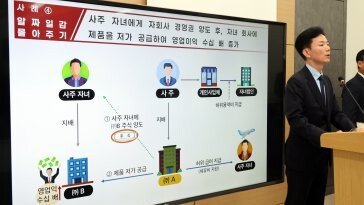
그뿐만이 아니다. 2008년을 향한 그림자 유세전은 2004년 대선 향배에도 영향을 미치고 있다.
민주당의 존 케리 후보가 존 에드워즈 상원의원을 러닝메이트(부통령 후보)로 지명하면서 ‘2008 그림자 유세전’은 더욱 급속히 확산되는 분위기다. 에드워즈 후보는 51세로 젊을 뿐 아니라 카리스마가 넘치는 정치인이다. 그의 공화당 상대인 딕 체니 부통령에 비하면 더욱 그렇다. 에드워즈 후보의 등장은 힐러리 클린턴 상원의원의 2008년 대권 도전 계획을 복잡하게 만들고 있을 뿐 아니라 빌 클린턴 전 대통령의 당내 영향력마저도 흔들 정도다.
무엇보다 ‘에드워즈 카드’는 ‘체니 카드’와 인물면에서 뚜렷이 구별된다. 체니가 보수파의 상징이고 공화당 내 우파의 확실한 지지를 받고 있긴 하지만 60대 중반이며 이미 심장병을 앓은 병력이 있다. 또 특혜 의혹으로 문제가 된 정유회사 핼리버튼의 최고경영자였다.
특히 지난주 에드워즈 후보와 체니 부통령을 비교한 타임의 여론조사가 발표되면서 ‘체니 회의론’은 더욱 높아졌다. 조사 결과 케리 후보와 조지 W 부시 대통령의 지지도는 47% 대 45%로 근소한 차를 보인 반면 러닝메이트인 에드워즈 후보와 체니 부통령은 47% 대 38%로 에드워즈 후보가 9%포인트나 앞섰다. 응답자의 3분의 1 이상은 체니 부통령의 ‘핼리버튼 유착 의혹’을 거론하며 그의 교체를 원하는 것으로 나타났다.
부시 대통령은 강력히 부인하고 있지만 체니 부통령이 8월 전당대회 이전에 교체되거나 스스로 사임할 것이라는 관측도 나오고 있다.
그렇다면 누가 체니 부통령의 대안이 될 수 있까. 부시 대통령의 입장에서 가장 매력적인 카드는 콜린 파월 국무장관일 것이다. 그는 대부분이 민주당 성향인 비(非) 백인계에 인기가 높다. 그러나 파월 장관이 과연 부시 대통령의 제안을 받아들일지 의문이다.
부시 진영이 강조하는 ‘테러와의 전쟁’을 생각해 보면 9·11테러를 원만히 해결한 루돌프 줄리아니 전 뉴욕시장도 좋은 대안이다. 하지만 그의 복잡한 사생활 전력은 ‘가족의 가치’를 강조하는 부시 진영의 유세 전략과 맞지 않는다.
펜실베이니아 주지사를 지낸 토머스 리지 국토안보부 장관도 꼽을 수 있다. 펜실베이니아는 20세기 들어 민주당의 대선 승리에 결정적인 승부처 역할을 해 온 곳이다. 그러나 리지 장관은 국토안보부를 맡으면서 대중의 관심에서 멀어졌고, 에드워즈 후보와 맞서기에는 카리스마가 부족하다.
공화당 부통령 후보로 지명된다면 2008년 선거에서 단연 두각을 나타낼 수 있는 다크호스가 미트 롬니 매사추세츠 주지사다. 그는 전 미시간 주지사 조지 롬니의 아들이자 전국적으로 지명도가 높은 베인컨설팅의 설립자다. 2002년 솔트레이크시티 동계올림픽 위원장을 지내기도 했다. 롬니 주지사는 TV를 다루는 데 능수능란하고 진보적인 매사추세츠주에서 58%의 지지를 받을 만큼 인기도 높다. 부시 대통령이 재선에 성공한다면 다음 대선은 에드워즈 후보와 롬니 주지사의 한판 승부가 될 가능성이 많다.
켄트 콜더 미국 존스홉킨스대 교수
THE SHADOWS OF 2008
Although the U.S. Presidential tickets of 2004 are not even formalized as yet, pending the upcoming national conventions, the shadow campaign for 2008 has already begun. This is being driven by the Vice Presidential choices that John Kerry and George W. Bush are making now.
That the Vice Presidency should inspire such intrigue and speculation is in a way paradoxical. The Vice President lacks much actual power, and has limited official duties, apart from presiding over the Senate. In the Twentieth Century only George Bush Sr. rose directly to the Oval Office, defeating a politically inept Michael Dukakis in 1988, with Richard Nixon only doing so eight years after a stinging defeat by John F. Kennedy in 1960. Both Al Gore and Walter Mondale lost in their attempts at succession.
Still, this year the intrigue regarding 2008 is deepening rapidly, and affecting the calculations of both Republicans and Democrats for 2004. The catalyst has been John Kerry’s recent selection of North Carolina Senator John Edwards, relatively young for American politics at 51, and a charismatic campaigner, as his Vice Presidential running mate. This clearly complicates the plans of Senator Hillary Clinton for a Presidential run in 2008. It also challenges the political influence within the party of former President Bill Clinton, and elevates the relative standing of Senator Edward Kennedy, one of Edwards’ prominent political mentors, who has been over-shadowed by Clinton for the past decade.
Kerry’s selection of Edwards also provokes a sharp personal contrast to Vice President Dick Cheney, which is affecting Republican political calculations for both 2004 and 2008. Cheney, with a history of heart problems, although only in his mid-60s, is a former Defense Secretary, White House Chief of Staff, and CEO of the controversial Halliburton oil-services firm, now prominent in Iraq reconstruction work. An outspoken conservative, he has been attracting strong fire from Democrats, although both he and his wife, a strong critic of political correctness, are beloved by much of the Republican Right.
A Time Magazine poll released this past week indicated that the contrasts between the two men seem to have deepened public skepticism about Cheney.
In the survey, Edwards was preferred to Cheney by 47 to 38 percent. More than one third of voters indicated that they thought Cheney should be replaced, with many troubled by his Halliburton connections. Given that the presidential race itself is very tight, with Kerry leading Bush by 47-45 in the same poll, the speculation is rising, although strongly denied by President Bush, that Cheney might well be replaced on the Republican ticket, or volunteer his resignation, before the Republican convention in another month’s time.
A youthful Republican Vice President, replacing Cheney, would, of course, deprive the White House of the experienced Cheney. It would also deprive President Bush of the opportunity to use internal party competition to bolster his own Presidential leverage until the very end of a second term. These drawbacks are no doubt reasons that Bush has resisted replacing Cheney so far, and may indeed continue to do so in future.
If political calculations in the difficult race with Kerry lead to Cheney’s replacement, however, who might the new face be? Four possibilities suggest themselves. The most attractive, from the President’s standpoint, could be Secretary of State Colin Powell, who is broadly popular, and could cut into the heavily Democratic majority of the minority vote. The problem could be Secretary Powell’s willingness to run, given the limited powers of the Vice Presidential office, and his frustration with how he was used in the lead-up to the Iraq War.
Given the political importance for the Bush campaign of the war on terrorism, highlighted by the staging of the Republican convention in New York City this year, another attractive replacement for Cheney might be former New York mayor Rudy Giulliani, so well-regarded for his decisive and sensitive responses to the “9/11” disaster. Apart from his demonstrated leadership ability, and remarkable success during his tenure as mayor in fighting crime and cleaning up New York City, however, Giulliani has had a complex personal life, having been involved in a bitter and widely publicized recent divorce that would complicate a prospective “family values” Bush campaign.
A third possibility could be Tom Ridge, Secretary of Homeland Security, and formerly governor of Pennsylvania. Ridge was a popular governor of a crucial swing state, which was vital to every successful Democratic Presidential campaign of the Twentieth Century. Yet he has receded from public attention in the difficult and low-profile Homeland Security job, and may lack the charisma needed to compete with John Edwards.
A final dark-horse candidate, who will definitely figure in the campaign stakes for 2008, even if he is not selected for the Vice Presidency this year, is the charismatic Republican Governor of Massachusetts, Mitt Romney. Governor Romney, who ironically will welcome the Democrats to their own convention as the home-state representative when they gather in Boston next week, is the son of former Michigan Governor George Romney, founder of the nationally known Bain Consulting Company, and former president of the Salt Lake City Olympic Committee of 2002. Romney is articulate on television, holds 58 percent popularity ratings in liberal Massachusetts, and would compete with Edwards in star power in the fall campaign this year. Indeed, if President Bush is re-elected, Edwards could well be competing with Romney for the Presidency in 2008.
|
세계의 눈 >
-

고양이 눈
구독
-

오늘과 내일
구독
-

청계천 옆 사진관
구독
-
- 좋아요
- 0개
-
- 슬퍼요
- 0개
-
- 화나요
- 0개
![[세계의 눈]고노 다로/미군 재배치와 일본 안보](https://dimg.donga.com/a/180/101/95/2/wps/NEWS/IMAGE/2004/08/04/6926279.1.jpg)



댓글 0